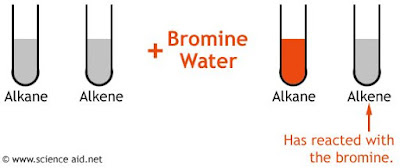
Test for Unsaturation (Unsaturation Test) in the Identification of Organic Compounds (Assignment / PPT)
Monday, April 20, 2020
1 Comment
What is Unsaturated Compounds and Unsaturation test?
- Organic compounds containing > C = C < or carbon-carbon triple bonds are called unsaturated compounds.
- An unsaturation test is a test that determines does the compound have any double bonds, triple bonds( multiple bond).
- Generally addition and oxidative reactions are used to detect unsaturation linkages.
- There are following tests are given below-
1. Bromine
in carbon tetrachloride test,
2. Potassium
permanganate test( Bayer’s test)
3. Tetranitromethane
test
- However, no single reaction gives sufficient information that can be used to identify the presence of double/triple bond. Therefore, both the test (qualitative ) given above should be performed before reaching to any conclusion.
BROMINE IN CARBON TETRACHLORIDE TEST:
- Bromine undergoes addition reaction with nearly all active unsaturated compounds like alkenes & alkynes.
- The decolourisation of solution takes place during the course of reaction.
- The discharge of bromine colour accompanied by the liberation of HBr gas indicates substitution and not addition.
- Such reactions is given by phenoles , aromatic amines, aldehydes , ketones & some compounds containing active methylene groups.
Mechanism for Bromine Test:
Procedure (Bromin test for Unsaturation in the lab):
In a test tube dissolve 100 mg of compounds in 2 ml of carbon tetrachloride and add few drops with shaking 5% solution of bromine in carbon tetrachloride. If decolourisation is observed , the compound may be unsaturated.
Some other examples
Precautions for Bromine Test:
(a)The tests should be
performed at room temperature.
(b)
Handle bromine solution carefully. Do
not inhale the vapours and also avoid its contact with the skin.
Potassium Permanganate test(Bayer’s Test):
1% Cold, dilute alkaline solution of Potassium Permanganate is known as Bayer's Reagent.- Potassium Permanganate is the strong oxidizing agent.
- Unsaturated compounds disappearance of the purple colour of potassium permanganate and formation of brown coloured ppt of manganese hydroxide .
- With water soluble substances, reaction is carried out in water whereas with those insoluble in water ,benzene or acetone solvent is used.
- The test is based on the fact that permanganate ion oxidise alkenes and alkynes type of compounds to glycols( diols) and also oxidises Phenols and Aldehydes.
- Alkenes decolourise the neutral/alkaline KMnO4 solution and vicinal glycols are formed (Bayer’s test). Reaction takes place as follows.
Mechanism for Bayer's Test:
Procedure for Bayer's Unsaturation Test in the Lab: In a test tube dissolve 100 mg of compound in 5 ml of water or acetone .Add 2% aqueous permanganate solution drop by drop and shake the test tube vigorously . Disappearance of purple colour with the formation of brown solution indicates that the compound may be unsaturated.
Some other examples:
THANK YOU…..!!!













ReplyDeletebookmarked!!, I really like your web site!
bsc time table